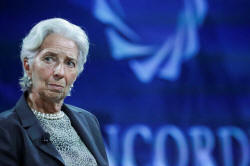Global financial stability has improved, but risks
ahead: IMF
 Send a link to a friend
Send a link to a friend
 [October 11, 2017]
By Lindsay Dunsmuir [October 11, 2017]
By Lindsay Dunsmuir
WASHINGTON (Reuters) - The global economic
recovery has strengthened financial stability but easy monetary and
financial conditions against a backdrop of sluggish inflation is
elevating medium-term risks, the International Monetary Fund said on
Wednesday.
The IMF, whose autumn meetings with the World Bank get under way in
Washington later this week, also noted risks are rotating from banks,
which have fortified their balance sheets, to financial markets as
credit spreads compress, volatility declines and asset prices rise.
"While increased risk appetite and search for yield are a welcome and
intended consequence of unconventional monetary policy measures...there
are risks if these trends extend too far," the IMF said in its biannual
global financial stability update.
A prolonged search for yield has raised the sensitivity of the financial
system to market and liquidity risks, the Fund said, keeping those risks
elevated.

The IMF urged national regulators to consider carefully any proposals
that would substantially ease capital, liquidity or prudential standards
in "light of their potential to damage the agenda of global regulatory
harmonization."
The improvement in near-term financial stability has been underpinned by
a broad-based global economic upswing.
On Tuesday, the IMF upgraded its global economic growth forecast for
2017 by 0.1 percentage point to 3.6 percent, and to 3.7 percent for
2018, from its April and July outlook, driven by a pickup in trade,
investment, and consumer confidence.
But global central banks have found themselves at different stages in
removing monetary policy accommodation, which has been complicated by
overall sluggish inflation.
[to top of second column] |

Christine Lagarde, Managing Director of the IMF, listens a question
during the Concordia Summit in Manhattan, New York, U.S., September
19, 2017. REUTERS/Jeenah Moon

The U.S. Federal Reserve has picked up the pace of interest rate rises
since it began a tightening cycle in late 2015, but the European Central
Bank and Bank of Japan have yet to move away from negative rates and
bond buying.
"Too quick an adjustment in monetary policies could cause unwanted
turbulence in financial markets and set back progress toward inflation
targets," the IMF said in its report, while keeping rates low for too
long may cause a harmful buildup in market and credit risks.
Elsewhere, the Fund warned that leverage in the non-financial sector was
now higher than before the financial crisis across the so-called G20
advanced economies as a whole.
Such leverage made households and companies more vulnerable to changes
in interest rates and weaker economic activity.
"The key challenge confronting policymakers is to ensure that the
buildup of financial vulnerabilities is contained while monetary policy
remains supportive of the global recovery," the IMF warned. "Otherwise,
rising debt loads and overstretched asset valuations could undermine
market confidence in the future, with repercussions that could put
global growth at risk."
(Reporting by Lindsay Dunsmuir; Editing by Andrea Ricci)
[© 2017 Thomson Reuters. All rights
reserved.] Copyright 2017 Reuters. All rights reserved. This material may not be published,
broadcast, rewritten or redistributed.
 |